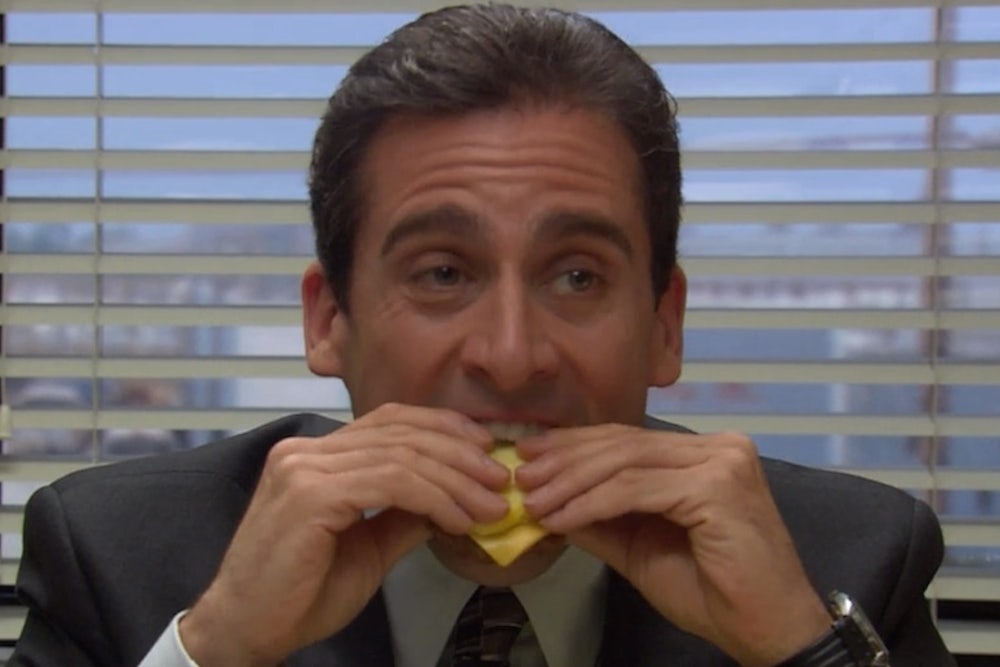In an episode from the most recent season of “Girls,” Hannah Horvath takes a job writing copy for sponsored content at GQ. For all the corporate world’s evils, Hannah realizes, there is one major perk of working an office job—free snacks (which is, incidentally, the title of the episode). These giveaways come to stand in for the alluring luster of full-time employment, which obscures, for a time at least, what Hannah ultimately comes to see as its creativity-killing, soul-draining nature.
Free snacks in the workplace are more than just a metaphor. As start-up culture proliferates as a corporate ideal and offices strive to ensure that their employees remain happy, the kind and quality of the food they stock has become ever more visible—a selling point for prospective hires, a bragging right for current workers, and a sore spot for their less well-fed friends.
Mmmm. Burgers, fries and @sirkensington Ketchup for all-team Tumblr lunch today. #yum pic.twitter.com/2kXfvn2I
— Tumblr (@tumblr) December 7, 2012The Tumblr office in Manhattan, for instance, has five kitchenettes, each fully stocked with granola bars, chips, yogurt, fresh fruit and veggies, cold brew coffee, and a seltzer machine. “We always wanted to create a really warm, welcoming, homey atmosphere here,” explained Megan Leet, Tumblr’s office operations manager, “so having a wide variety of snacks for people was just a given for us.” Having snacks available on every floor, Leet said, is “just a comforting thing that people like … It also increases productivity: You don't have to go seek out food, it's just kind of right there.” Since Tumblr was bought by Yahoo! last year, the parent company has even started picking up the tab on lunch and some breakfasts—providing offices with five meals a week. In the summer, Leet arranges for weekly food truck visits.
We’ve come a long way from the coffee cart.
But what is all this food doing to the office environment—apart from making everyone’s keyboards a little stickier? The jury is still out on whether snacking itself has benefits to one’s health or performance—a 2011 study concluded that while frequent snacking did not seem to correlate with benefits to mental health and cognitive performance, it also did not correlate with negative outcomes. Another study found that while a mid-afternoon snack could help improve memory, it did not improve attention as reliably. This study was carried out with children, but that may or may not make it less valid than those conducted on adults—as experts at the British Nutritional Foundation noted in a review last year, “despite many years of scientific interest in snacking, the lack of consistency in study design and snacking definitions and the array of potential confounding factors (e.g., physical activity levels) makes interpretation of findings difficult.”
Perhaps a more relevant line of scientific research concerns how and why we eat at work. This research makes clear that it’s hard to avoid eating food when it’s around, even for rational, working adults. (We also know that there are strong ties between chronic job stress and being overweight, and that obesity is linked to fatigue and lowered productivity.) “I’ve had meetings with the caterer and said, ‘We can't have this, I’m going to eat it all,’” Leet joked.
In fact, employees may not even fully register that they are consuming office goodies—in part because they are so convenient. When it comes to snacking, we are especially bad not only at self-control, but also at knowing how bad we are at self-control. In one recent study, 40 adult secretaries were offered chocolate in various degrees of proximity. As the chart below shows, they ate more candies when the candies were visible and near, and only slightly fewer when they had to get up to get the candy but it was still visible. This tendency to eat more when the sweets are near seems obvious, but the tendency to eat more was fuelled by quantitative misperception: The secretaries also tended to underestimate their consumption when the candy was close and to overestimate how much they had consumed when it was farther away.

And having all those snacks available may have taught us to think that we “need” them. Other studies show that we often feel hungry as a result of learned environmental cues, even when our bodies could do without the food. The 2013 review from the British Nutrition Foundation’s Nutrition Bulletin cites several examples of research suggesting that snacking can be a conditioned response to external stimuli rather than just a natural, internal response to energy deficit. Scientists have also demonstrated that habit strength is a strong predictor of unhealthy snacking (though it’s unclear whether this indicates correlation or causation). Once we’re used to indulging in unhealthy snacks, the habit matters more in predicting whether or not we will keep snacking than our best conscious intentions to change our ways. In other words, growing accustomed to having snacks nearby may mean we eat more of them, even if we try not to.
We don’t need science to tell us that snacks can lift our moods and our blood sugar, and that office work often demands such pick-me-ups. But free snacks aren’t in and of themselves a bonus when their appeal may well be a product of—and help contribute to—our own irrational behaviors.
